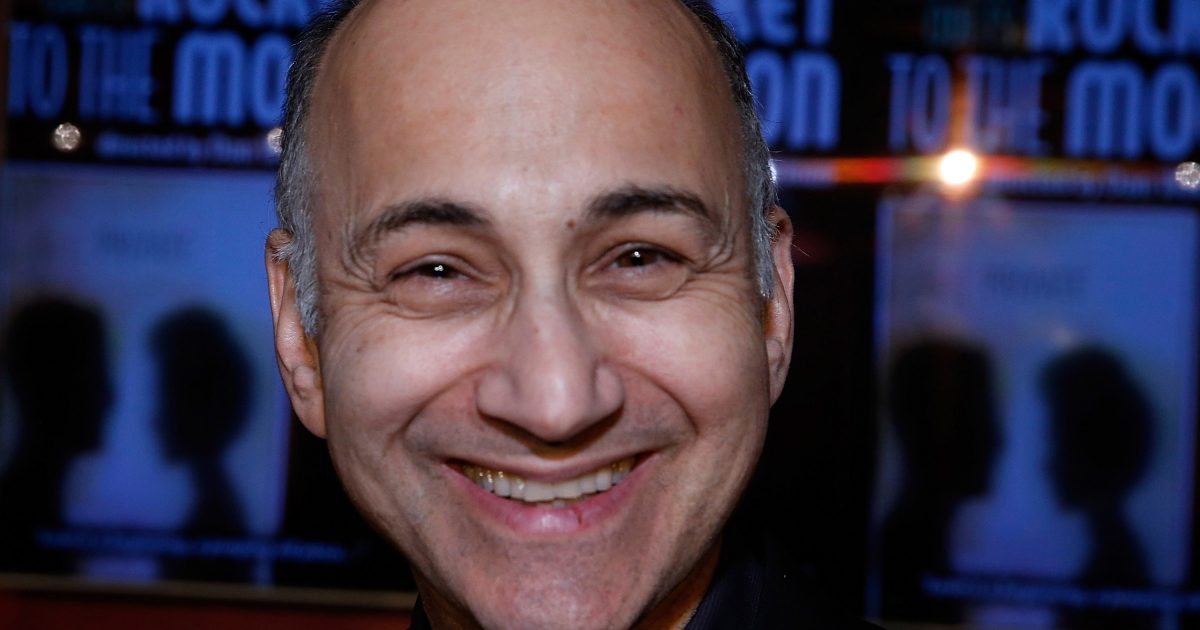Remembering Ned Eisenberg
- Ned Eisenberg recently passed after battling two different cancers at once: ocular melanoma and cholangiocarcinoma. Many co-workers have taken the time to remember him on social media.
- Ocular melanoma, also known as uveal or choroidal melanoma, is a rare disease, but is the most common eye cancer found in adults. Experts recommend having your eyes dilated every year to check for the disease.
- Cholangiocarcinoma also known as bile duct cancer, is a disease that develops in the slender tubes (bile ducts) that carry the digestive fluid bile and connect your liver to your gallbladder and small intestine. It is most common in people older than age 50, but it can occur at any age.
- Grief is an unavoidable and essential part of the healing process following the loss of a loved one to cancer. But moving forward doesn't mean you have to forget about the one you love. Things like time and therapy can also help you cope.
Eisenberg was a TV and movie star known for his roles as defense attorney Roger Kressler in Law & Order: Special Victims Unit, Detective Hauser on the crime show Mare of Easttown and Anthony Fanelli on the sitcom The Fanelli Boys, among others.

Saying Goodbye to Ned Eisenberg
Many actors and co-workers alike have made a point to remember the beloved actor that was Eisenberg. One of his Law & Order colleagues, actor Christopher Meloni, wanted to say something special about his friend.Ned Eisenberg dead: Law & Order SVU actor dies at 65 | https://t.co/2lxdeCKBfA
I started with Ned in 1990 on The Fanelli Boys.
Great actor.
A singular voice.
Always ready with a smile and a laugh.
A beautiful gentle human being.Chris Meloni (@Chris_Meloni) March 1, 2022
"I started with Ned in 1990 on The Fanelli Boys," he wrote in a tweet. "Great actor. A singular voice. Always ready with a smile and a laugh. A beautiful gentle human being."
Another Law & Order star, Mariska Hargitay, made a sweet post for the late actor.
View this post on Instagram
"My heart is so full of sadness over the loss of our dear, dear Ned Eisenberg," she wrote. "What a light and what a love. And such a first-rate actor, which pales next to him as a first-rate human."
Law & Order: Special Victims Unit showrunner Warren Leight shared a tribute to Eisenberg on Twitter along with a set photo.
Oh Ned…
Rest in Peace, our sweet friend, and my fellow Naked Angel, Ned Eisenberg.@RaulEEsparza @Mariska pic.twitter.com/AN4CegZTAR
Warren Leight (@warrenleightTV) March 1, 2022
“Oh Ned… Rest in Peace, our sweet friend, and my fellow Naked Angel, Ned Eisenberg,” Leight tweeted referencing the Naked Angels theater company that Eisenberg was co-founder of.
Outside of Law & Order actress Jennifer Tilly, who worked with Eisenberg in one of her early movies, took the time to remember her friend.
RIP #NedEisenberg. We worked together on one of the first films I ever did: "Moving Violations." Just a great all-around good guy. Always in good spirits, no matter how difficult the filming conditions were. He kept us laughing. pic.twitter.com/XKAaJHdnvY
Jennifer Tilly (@JenniferTilly) February 28, 2022
“RIP #NedEisenberg. We worked together on one of the first films I ever did: ‘Moving Violations.’ Just a great all-around good guy,” she wrote. “Always in good spirits, no matter how difficult the filming conditions were. He kept us laughing.”
Even author Lawrence Wright made sure to share the special impact Eisenberg left on him.
Ned played Menachem Begin in the Old Globe production of my play Camp David. I worried he wouldn't bring the necessary emotion. Opening night the audience in tears. Timing. Except for his death, too soon. Adieu friend. https://t.co/OOWcqG3JsE
Lawrence Wright (@lawrence_wright) March 1, 2022
“Ned played Menachem Begin in the Old Globe production of my play Camp David,” he tweeted. “I worried he wouldn’t bring the necessary emotion. Opening night the audience in tears. Timing. Except for his death, too soon. Adieu friend.”
Ned Eisenberg's Cancer Journey
Eisenberg's health battle involved two different types of cancer: cholangiocarcinoma and ocular melanoma. In a touching statement from Eisenberg's wife she said her husband faced his cancers with courage.
"As Ned would say, he was attacked by two very rare assassins cholangiocarcinoma and ocular melanoma," Dunnock said. "Over the course of two years, he bravely fought the cancers in private while continuing to work in show business to ensure that his medical coverage paid for himself and his family."
The frequency of having more than one primary cancer, a term used to describe the original, or first, tumor in the body, at the same time or around the same time has been reported as varying between 2.4 and 17 percent, according to an article in the journal ONCOLOGY. Having two primary cancers is different than a cancer recurrence because a recurrence means the same cancer from the first diagnosis has returned after a period of time when the cancer could not be detected post-treatment.
Hence, it's not very common to fight two separate cancer battles at once. That being said, the journal also reports "the incidence of multiple primary cancers is increasing due to increased detection of early-stage cancers and advances in cancer treatment."
What Is Ocular Melanoma?
Ocular melanoma, also known as uveal or choroidal melanoma, is a rare disease, but is the most common eye cancer found in adults.
The Dana-Farber Cancer Institute reports that approximately 2,500 adults are diagnosed with ocular melanoma each year. Their Ocular Melanoma Center also says most ocular melanomas can be difficult to detect because they occur in a part of the eye you can't see. But when symptoms do arise, they can appear as a dark spot on the iris or conjunctiva, blurred or distorted vision, a blind spot in your side vision or the sensation of flashing lights.
"In most cases, these are tumors that are detected upon a routine sight test by your optometrist or your ophthalmologist," Dr. Rizwan Haq, director of the Ocular Melanoma Center at Dana-Farber, said in a video. "Most patients do not experience symptoms when they have a diagnosis of ocular melanoma."
Even though the disease is rare, Dr. Sapna Patel, a melanoma oncologist at MD Anderson Cancer Center, previously told SurvivorNet she recommends getting regular check-ups to monitor for uveal melanoma.
"Everyone should get dilated every year," she said. "There is an 'I get dilated' campaign, that started in the U.S., to try and inform the general public. Even if you don't need corrective lenses or glasses, contact lenses … it's still important to have your eyes dilated and examined for physical changes such as melanoma or moles in the eye."
The cause of ocular melanoma is uncertain at this point, but people with fair skin that burn easily are at a higher risk for developing the disease. That being said, there is no evidence that ocular melanoma is related to sun exposure unlike melanoma of the skin.
"Unfortunately, we don't know what causes uveal melanoma, which makes it even more important that everybody gets their eyes checked, because we don't know who is at risk for this disease," Dr. Patel told SurvivorNet.
What Is Cholangiocarcinoma?
Cholangiocarcinoma, also known as bile duct cancer, is a disease that develops in the slender tubes (bile ducts) that carry the digestive fluid bile and connect your liver to your gallbladder and small intestine.
Typically, the disease occurs in people older than age 50, though it can occur at any age. And, unfortunately, cholangiocarcinoma is often diagnosed at an advanced stage making it difficult to treat, but below are possible symptoms of the cancer to look out for.
- Yellowing of your skin and the whites of your eyes (jaundice)
- Intensely itchy skin
- White-colored stools
- Fatigue
- Abdominal pain on the right side, just below the ribs
- Losing weight without trying
- Fever
- Night sweats
- Dark urine
As always, these symptoms do not necessarily mean you have bile duct cancer, but it is important to always tell your doctor about any changes you've noticed to your health.
Losing a Loved One to Cancer
Grief is an inevitable and essential part of the healing process after losing a loved one to cancer. And there's definitely no one way to cope, but Doug Wendt shared his thoughts on grief in a previous interview with SurvivorNet after losing his wife, Alice, to ovarian cancer.
"We're never gonna move on, I don't even think I want to move on, but I do want to move forward," Wendt said. "That's an important distinction, and I encourage anybody who goes through this journey as a caregiver and then has to face loss, to think very carefully about how to move forward."
Everyone's journey of grief looks different, but therapy and support groups can also be wonderful options to explore. It's also important to keep in mind that time does not heal everything, but it certainly helps.
In an earlier interview with SurvivorNet, Camila Legaspi shared her own advice on grief after her mother died of breast cancer. For her, therapy made all the difference.
"Therapy Saved My Life": After Losing A Loved One, Don't Be Afraid To Ask For Help
"Therapy saved my life," Legaspi said. "I was dealing with some really intense anxiety and depression at that point. It just changed my life, because I was so drained by all the negativity that was going on. Going to a therapist helped me realize that there was still so much out there for me, that I still had my family, that I still had my siblings."
Legaspi also wanted to remind people that even though it can be an incredibly difficult experience to process, things will get better.
"When you lose someone, it's really, really, really hard," Legaspi said. "I'm so happy that I talked to my therapist. Keep your chin up, and it's going to be OK. No matter what happens, it's going to be OK."
Learn more about SurvivorNet's rigorous medical review process.


